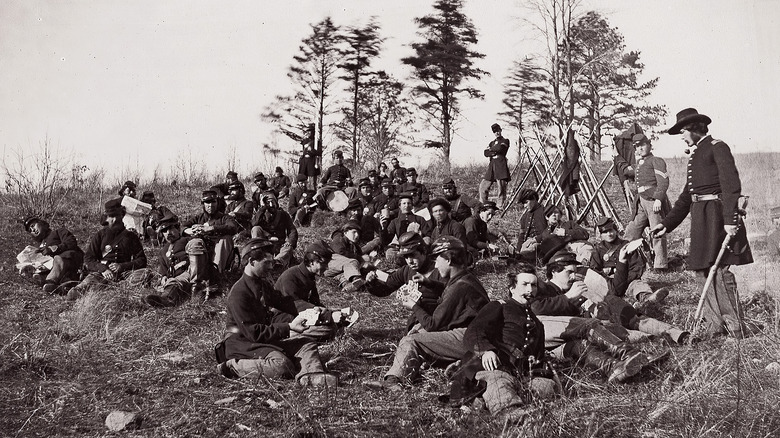The Origin Of The Phrase 'Heard It Through The Grapevine'
It's a line you've probably uttered at least once in your life, maybe usually while singing along to the Marvin Gaye song of (almost) the same title. The expression "heard it through the grapevine" has been around for much longer than the aforementioned Motown classic, and it simply means you heard a rumor or a piece of unconfirmed information, usually from an unnamed source. That lines up pretty well with the lyrics of the song, which tells the story of a man who heard from someone else that his girlfriend was planning to leave him for another guy. But where does the phrase come from anyway?
According to One Stop English, "heard it through the grapevine" traces its origin to the United States, all the way back in the 19th century after Samuel Morse invented the telegraph system. This was a time when telecommunication was still in its infancy, and that meant the system required an extensive route with thousands of miles worth of wire installed. Much like the telephone wires we know from modern times, the telegraph wires were located several feet above the ground and held in place by poles. People who noticed the wires and poles commented that they resembled the strings used to train grapevines, and with that in mind, a popular expression was born.
The expression became far more common during the Civil War
Most accounts suggest that "heard it through the grapevine" became a commonly-used expression during the Civil War, back when the telegraph was used by soldiers to discuss rumors. This was something a soldier would say to another when asked if a certain piece of information was true or not (via One Stop English). But there's another Civil War-era story that could also explain why the phrase grew in popularity in those times.
The New York Public Library website includes an entry on the Old Grapevine Tavern, a three-story establishment in Greenwich Village that was originally built in the 18th century as a private residence. After getting converted into a saloon called The Hawthorne, the place got its more familiar name in the early 1800s because one side of the building was covered by a "gnarly old grapevine." Fast forward to the Civil War and the Old Grapevine was frequented by Union officers and Confederate spies alike, where they would presumably spread some gossip about the opposing side, thus making "heard it through the grapevine" particularly meaningful.
During post-Civil War times, Greenwich Village denizens would continue frequenting the tavern, once again to discuss the latest news and rumors. And while the establishment was demolished in 1915 — 32 years after its titular grapevine was cut down — in order to make way for a six-story apartment, its legacy remains as another possible point of origin for the phrase "heard it through the grapevine."

